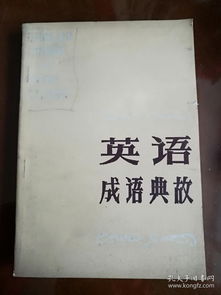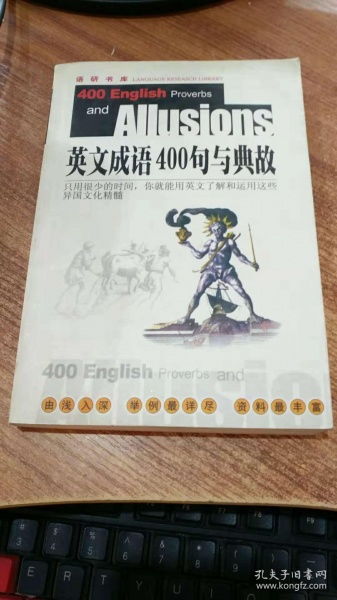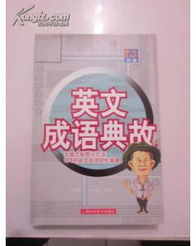英文成语典故(英语的成语故事)
1.英语的成语故事
亡羊补牢------Mend the fold after the sheep have been stolen
守株待兔------Wait every day under the tree, in the hope that a hare would kill itself by crashing into a tree trunk
坐井观天------Limited outlook
程门立雪------Stand in the snow to wait upon Master Cheng respectfully
入木三分------Penetrating
完璧归赵------To return a thing intact to its owner
负荆请罪------To offer a humble apology
凿壁借光------Bore a hole on the wall in order to get some light from the neighbour's house
乐不思蜀------Have much enjoyment and forget to go back home
草木皆兵------State of extreme nervousness
马革裹尸------Die on the battlefield
闻鸡起舞------Rise up upon hearing the crow of a rooster and practise with the sword
买椟还珠------Show lack of judgment
南辕北辙------Act in a way that defeats one 's purpose
楼主够了吧!不够跟我说哦!!

2.英语的成语故事
画蛇添足 An official of the ancient State of Chu awarded a pot of wine to his men after the ceremony of Spring Sacrifice. One man said, “We have only one pot of wine. It's not enough for all of us but sufficient for one. Let's determine who'll have the wine by drawing a snake on the ground. He who finishes first will have the wine.” The others agreed. Very soon, one man finished his snake. He was about to drink the wine when he saw the others were still busy drawing. He said complacently,“How slowly you are! I still have enough time to add feet to my snke.” But before he finished the feet, another man finished his snke and grabbed the pot from him, saying,“Whoever has seen a snake with feet? Yours is not a snke. So the wine should be mine!” He drank the wine. The man adding the feet to the snake had to give in and could only regret his foolishness. 楚国有一个官员,在春天祭过了祖宗之后,便将一壶酒赏给他的办事人员喝。
有人提议:“我们只有一壶酒,肯定不够我们大家喝的,一个人喝倒是绰绰有余。我们每人在地上画一条蛇,谁画得最快,就把这壶酒给他。”
大家都同意了。 有一个人很快就把蛇画好了。
他正打算喝这壶酒时,看见别人都还忙着画呢。他就得意扬扬地说:“你们画得好慢呀,等我再画上几只脚吧!” 他的蛇脚还没画完,另一个人已经把蛇画好了。
那人把酒壶夺了过去说:“有谁见过长脚的蛇?你画的不是蛇,这壶酒应该是我的了。”说罢,就喝起酒来。
那个给蛇画脚的人没办法,只能懊悔自己的愚蠢。一鸣惊人 In the Warring States Period, Duke Wei of Qi neglected state affairs, for the first three years of his reign, giving himself over to dissipation. One of his ministers, Chun Yukun who had a good sense of humour, said to him: 'There is a big bird which has neither taken wing nor sung for three years.' The duke answered, 'Once that bird starts to fly and sing, it will astonish the world.' The duke thereupon devoted himself to his duties and built his state up into a powerful one. 战国时代,齐威王即位后做了三年国君,只顾享乐,不理政事。
有个善于说笑话的人叫淳于髡,一天对齐威王说:“城里有一只大鸟,三年不飞也不叫,你知道这是什么道理?”齐威王说:“这鸟不飞则罢,一飞就冲天;不鸣则罢,一鸣就惊人。”在淳于髡的激发下,齐威王开始治理国家,取得很大成绩,齐国的声威一直保持了几十年。
杞人忧天 In the Spring and Autumn Period, in the State of Qi there was a man who always let his imagination run away with him. One day he even worried that the sky would fall on his head. He was so worried that he could neither eat nor sleep. Later, someone persuaded him that his fears were Ground-less. 春秋时代,杞国有一个喜欢胡思乱想的人。一天,他竟然想到,天会塌下来,地会陷下去,自己到哪里去安身?这个人越想越害怕,整天愁眉苦脸,坐立不安,白天吃不下饭,晚上睡不着觉。
后来有人耐心地开到他,他才放下了心。精卫填海 Once upon a time, the youngest daughter of Emperor Yan, legendary ruler of primitive China, went boating on the Eastern Sea. While she was enjoying herself, a strong wind rose on the sea and her boat capsized. Just before she was buried by the surging waves, her spirit turned into a beautiful bird. As it flew over the roaring sea, it cried sadly in the sound "jinwei, jingwei". That was why people called it "Jingwei". The bird lived on a mountain near the sea. It hated the sea so much that it decided to fill it up. Every day, it flew to and fro between the mountain and the sea, carrying in a twig or a pebble from the mountain and dropping it into the sea. One day, the roaring sea said to Jingwei, "Poor little bird, stop doing that meaningless thing! You'll never fill me up." Jingwei replied, "I'll fill you up no doubt! I will, even if it'll take me thousands of years! I'll fight on until doomsday!" The brave little bird kept carrying twigs and pebbles from the mountain to the Eastern Sea without taking a rest. From this fable comes the idiom "The bird Jingwei trying to fill the sea". We use it to describe people who are firm and indomitable and will not stop until they reach their goal. 从前,炎帝(传说中中国原始社会的统治者)的小女儿在东海上划船。
正当她划得高兴时,海面上突然升起一阵大风,把她的小船弄翻了。就在她要被汹涌的波浪吞 没时,她的灵魂变成了一只美丽的小鸟。
它飞过那咆哮的海面,伤心的叫着"精卫,精卫"的声音。所以人们就叫她"精卫"。
精卫鸟住在靠海的一座山上。它非常恨大海,所以决心要把它填平。
它每天来回于山海之间,把从山上衔来的小树枝和小石子扔在大海里。 一天,咆哮的大海对精卫说:"可怜的小鸟,停止你那无谓的举动吧!你是永远都填不平我的。
" 精卫回答说:"我当然会把。

3.英语成语故事带翻译
Sweat is HuoGuang, emperor han commander-in-chief of TuoGu ministers, drinking eight years of emperor han style-came kisen, ruling pomp very heavy. HuoGuang nearby have a call YangChang people, act is timid, popular with HuoGuang recognition, rose to prime minister position, seal for anping syndrome. Actually, YangChang humanness cowardly incompetence, timid, not when the prime minister of the material. 74 B.C., was only twenty one-year-old han emperor died.both in WeiYangGong kisen, with all the princes HuoGuang counsel, chose the emperor's grandson made WangLiuHe nearbu heir. Behold LiuHe ascended the mid-north song and dance, often pleasure-resorts. HuoGuang heard later, anxieties, and bike ride general ZhangAn births, TianYanNian secret counsel, on to nullify LiuHe, set up other Yin jun. After TianYanNian HuoGuangPa goading agreed to jointly YangChang, tell gun. YangChang all of a sudden, she was scared to sweat, panic, just something indistinctly fence. YangChang wife, is TaiShiGong sima qian's daughter, quite have the guts. She saw her husband shilly-shally appearance, secretly worried, while TianYanNian change clothes walk away, infero-anterior advised her husband and said, "National affairs, will shilly-shally. General has ChengYi, you should also chosin reservoir, otherwise inevitable difficult ahead." YangChang step back and forth in the house, but had no acid attention. Just at this time TianYanNian back, SiMaFu people avoid inferior, straight-tempered without embarrassment and TianYanNian meet, told TianYanNian, her husband willing to listen to the general's command. TianYanNian after listening pleased to take leave walk. TianYanNian returns HuoGuang, HuoGuang very satisfied. YangChang brought all the princes immediately arrange table, playing please dowager. The next day, YangChang advice, ernie see luang nearbu king unbearable successin statement of reason. Queen letter removed immediately LiuHe, another sign of emperor of the once SunLiu enquiry for jun, was said han XuanDi.Idioms citations, han shu YangChang biography of our afraid, not words. Jia sweated back ACTS yes just.Idioms interpretations ", "Jia drenched, sweating much soaked backbone. Describe sweat. Also describe extreme fear or ashamed excessive.汗流浃背 汉大将军霍光,是汉武帝的托孤重臣,辅佐八岁即位的汉昭帝执政,威势很重。
霍光身边有个叫杨敞的人,行事谨小慎微,颇受霍光赏识,升至丞相职位,封为安平候。其实,杨敞为人懦弱无能,胆小怕事,根本不是当丞相的材料。
公元前74年,年仅廿一岁的汉昭帝驾崩于未央宫,霍光与众臣商议,选了汉武帝的孙子昌邑王刘贺作继承人。谁知刘贺继位后,经常宴饮歌舞,寻欢作乐。
霍光听说后,忧心忡忡,与车骑将军张安世、大司马田延年秘密商议,打算废掉刘贺,另立贤君。计议商定后,霍光派田延年告诉杨敞、以便共同行事。
杨敞一听,顿时吓得汗流浃背,惊恐万分,只是含含糊糊,不置可否。杨敞的妻子,是太史公司马迁的女儿,颇有胆识。
她见丈夫犹豫不决的样子,暗暗着急,趁田延年更衣走开时,上前劝丈夫说;“国家大事,岂能犹豫不决。大将军已有成议,你也应当速战速决,否则必然太难临头。”
杨敞在房里来回酸步,却拿不定注意。正巧此时田延年回来,司马夫人回避不及,索性大大方方地与田延年相见,告知田延年,她丈夫愿意听从大将军的吩咐。
田延年听了后高兴地告辞走了。田延年回报霍光,霍光十分满意,马上安排杨敞领众臣上表,奏请皇太后。
第二天,杨敞与群臣遏见皇太后,陈述昌邑王不堪继承王位的原因。太后立即下诏废去刘贺,另立汉武帝的曾孙刘询为君,史称汉宣帝。
成语出处《汉书·杨敞传》敝惊惧,不知所言。汗出浃背徒唯唯而已。
成语释义“浃”,湿透,出汗多,湿透脊梁。形容满身大汗。
也形容极度惶恐或惭愧过度。
4.急需几篇英语成语故事
掩耳盗铃Plugging One's Ears While Stealing a Bell 春秋时侯,晋国贵族智伯灭掉了范氏。
有人趁机跑到范氏家里想偷点东西,看见院子里吊着一口大钟。钟是用上等青铜铸成的,造型和图案都很精美。
小偷心里高兴极了,想把这口精美的大钟背回自已家去。可是钟又大又重,怎么也挪不动。
他想来想去,只有一个办法,那就是把钟敲碎,然后再分别搬回家。 小偷找来一把大大锤,拼命朝钟砸去,咣的一声巨响,把他吓了一大跳。
小偷着慌,心想这下糟了,这种声不就等于是告诉人们我正在这里偷钟吗?他心里一急,身子一下子扑到了钟上,张开双臂想捂住钟声,可钟声又怎么捂得住呢!钟声依然悠悠地传向远方。 他越听越害怕,不同自由地抽回双手,使劲捂住自已的耳朵。
“咦,钟声变小了,听不见了!”小偷高兴起来,“妙极了!把耳朵捂住不住就听不进钟声了吗!”他立刻找来两个布团,把耳朵塞住,心想,这下谁也听不见钟声了。于是就放手砸起钟来,一下一下,钟声响亮地传到很远的地方。
人们听到钟声蜂拥而至把小偷捉住了。 故事出自《吕氏春秋·自知》“掩耳盗钟”被说成“掩耳盗铃”,比喻愚蠢自欺的掩饰行为。
Plugging One's Ears While Stealing a Bell During the Spring and Autumn period,Zhi Bo of the State of Jin destroyed Fan's family.Taking advantage of this occasion,a man went to Fan's house and tried to steal something.As soon as the man entered the gate,he saw that there hung a big bell in the courtyard.The bell was cast in high-quality bronza,and was beautiful in design and shape.The theif was very glad,and decided to carry this beautiful bell back home.But no matter how hard he tried,he could not move the bell,because the bell was both big and heavy.He thought and thought again,and believed there was only one way to solve the problem.He had to break the bell to pieces before he was able to carry them back to his home separately. The thief found a big iron hammer,with which he struck the bell with all his might.The striking produced an enormous crashing sound,which might.The striking produced an enormous crashing sound,which made the thief terribly frightened.The thief got flurried,thinking that it was too bad to have produced the crashiing sound which would himself on the bell,trying to muffle the crashing sound with his arms.But how could the crashing sound of the bell be muffled?The crashing sound still kept drifting melodiously to distant places.The more he listened to the sound,the more frightened hw became.He xubconsciously shrank back,and covered his ears hard with his hands."Hey,the sound becomes fainter,inaudible,"the thief became cheerful at once," wonderful!The sound of the bell can not be heard when the ears are covered."He immediately got some odd bits of cloth,made two rolls with them,and had his ears plugged with the two cloth rolls.He thought that in this way nobody could hear the sound of the bell.Feeling relieved,he began striking the bell,one blow after another.The resounding sound of the bell was heard at distant places,and finally people caught the thief by gracing the sound. This story comes from"Knowing Yourself" in The Annals by Buwei,written just before the Qin Dynasty(221-207 B.C.)was founded.Allegedly,when Li Yuan,Emperor Gao Zu of the Tang Dynasty(618-907),read this story,he felt it simply ridiculous and said,"This is what is called plugging one's ears while stealing a bell." Later,people have used the set phrase "plugging one's ears while stealing a bell" to refer to the ignorance and foolishness of the person who deceives himself as well as others.。
5.英文小成语故事
A woman had something wrong with her heart. So she went to see a doctor. He was a new doctor and didn't know her, so he first asked some questions. And one of them was, "How old are you?"
"Well," the woman said, "I don't know, doctor. But I will try to think. Oh, I remember now. When I got married, I was eighteen and my husband was thirty. Now my husband is sixty, which is twice thirty. I am sure. So I am twice eighteen. That is, thirty-six, isn't it?"
一位女士有心脏病,去看医生。那是个新来的医生,不认识她,所以先问了几个问题,其中一个是:你多大了?
“哦,”这女人说,“我不记得了,医生,但是我可以努力去想。哦,我记起来了,我结婚的时候,是18岁,我丈夫30岁,现在我丈夫60岁,是30的两倍,那我是18的两倍,也就是36岁,对不对?”
6.谁能提供十篇以上英语成语小故事
天衣无缝one summer night, when the moon was very bright he suddenly saw a girl descending(下降) slowly from the sky. he observed the girl closely, and found that the dress she was wearing was seamless(无缝的) . he was puzzled, and asked why. the girl answered,"heavenly clothes are not sewn with needle and thread."传说古代太原人郭翰在夏夜里乘凉,见一个仙女从天上下来,她身穿白衣,美丽绝伦。
她告诉他她名叫织女。郭翰仔细欣赏织女的衣裳浑然一体,竟看不出一丝线缝,好奇问织女。
织女答道:“天衣本非针线为也。”this idiom is used metaphorically to indicate the flawless handling of things. it can also be used to indicate a perfectly written poem or other literary article.神话传说,仙女的衣服没有衣缝。
比喻事物周密完善,找不出什么毛病。对牛弹琴Gong Mingyi was a famous musician in ancient times, who played the lute very well.公明仪是古代一位很有名的音乐家,弹得一手好琴。
One day, while playing the lute indoors, Gong Mingyi saw a cow eating grass leisurely outside the window. He had a sudden whim to play some melodies for the cow. He first played the "Exercise of Qing Jiao", but the cow still kept on eating grass with head lowered. He seemed to realize that the melody was too highbrow for the cow to understand.有一天,他在室内弹琴,看见一头牛在窗外悠闲地吃着草。他忽然想弹几曲给牛听听。
他先弹了一曲“清角之操”。可是,牛还是跟刚才一样,只顾低着头吃草。
他似乎意识到,这支曲子太高雅了,牛没有听懂。So he played several other melodies, imitating the buzzing sounds of swarms of flying mosquitoes, and the bleats of a calf looking for its companions. At this, to his surprise, the cow stopped eating grass, but raised its head, pricked up its ears, wagged its tail and, pacing up and down in small steps, began to listen attentively.于是,他弹了另外几支曲子,模拟蚊子成群结队飞来飞去的嗡嗡声;模拟小牛犊寻找伙伴的眸眸叫唤声。
这样一来,这头牛竟然不吃草了,抬起头,竖着耳朵,甩着尾巴,迈着小步,留心地倾听起来。
7.简洁的成语故事(英文版)
A man from the State of Zheng bought shoes)Once upon a time , a man in the State of Zheng went to the market to buy a pair of shoes. Before he left for the market, he had measured his feet with a piece me straw. However , he couldn't find the measurement because he had left it at home . So he had to say sorry to the owner that he had to go home for it, which confused the owner why he didn't try the shoes on with his own feet . The man smiled to the owner , " I would rather believe in the measuremens than my own feet."。
8.谁有关于英语的成语故事
源自希腊罗马神话传说的1.An Apple of Discord争斗之源;不和之因;祸根 An Apple of Discord直译为“纠纷的苹果”,出自荷马史诗Iliad中的希腊神话故事 传说希腊阿耳戈英雄(Argonaut)珀琉斯(Peleus)和爱琴海海神涅柔斯的女儿西蒂斯(Thetis)在珀利翁山举行婚礼,大摆宴席。
他们邀请了奥林匹斯上(Olympus)的诸神参加喜筵,不知是有意还是无心,惟独没有邀请掌管争执的女神厄里斯(Eris)。这位女神恼羞成怒,决定在这次喜筵上制造不和。
于是,她不请自来,并悄悄在筵席上放了一个金苹果,上面镌刻着“属于最美者”几个字。天后赫拉(Hera),智慧女神雅典娜(Athena)、爱与美之神阿芙罗狄蒂(Aphrodite),都自以为最美,应得金苹果,获得“最美者”称号。
她们争执不下,闹到众神之父宙斯(Zeus)那里,但宙斯碍于难言之隐,不愿偏袒任何一方,就要她们去找特洛伊的王子帕里斯(Paris)评判。三位女神为了获得金苹果,都各自私许帕里斯以某种好处:赫拉许给他以广袤国土和掌握富饶财宝的权利,雅典娜许以文武全才和胜利的荣誉,阿芙罗狄蒂则许他成为世界上最美艳女子的丈夫。
年青的帕里斯在富贵、荣誉和美女之间选择了后者,便把金苹果判给爱与美之神。为此,赫拉和雅典娜怀恨帕里斯,连带也憎恨整个特洛伊人。
后来阿芙罗狄蒂为了履行诺言,帮助帕里斯拐走了斯巴达国王墨涅俄斯的王后---绝世美女海伦(Helen),从而引起了历时10年的特洛伊战争。不和女神厄里斯丢下的那个苹果,不仅成了天上3位女神之间不和的根源,而且也成为了人间2个民族之间战争的起因。
因此,在英语中产生了an apple of discord这个成语,常用来比喻any subject of disagreement and contention;the root of the trouble;dispute等意义 这个成语最初为公元2世纪时的古罗马历史学家马克·朱里·尤斯丁(Marcus Juninus Justinus)所使用,后来广泛的流传到欧洲许多语言中去,成为了一个国际性成语。eg: He throwing us an apple of discord,we soon quarrelled again. The dispute about inheriting estate formed an apple of discord between them. This problem seems to be an apple of discord between the Soviet union and the USA.2.The Heel of Achilles 亦作The Achilles' Heel唯一弱点;薄弱环节;要害 The Heel of Achilles直译是“阿基里斯的脚踵”,是个在欧洲广泛流行的国际性成语。
它源自荷马史诗Iliad中的希腊神话故事。 阿基里斯是希腊联军里最英勇善战的骁将,也是荷马史诗Iliad里的主要人物之一。
传说他是希腊密耳弥多涅斯人的国王珀琉斯和海神的女儿西蒂斯所生的儿子。阿基里斯瓜瓜坠地以后,母亲想使儿子健壮永生,把他放在火里锻炼,又捏着他的脚踵倒浸在冥河(Styx)圣水里浸泡。
因此阿基里斯浑身象钢筋铁骨,刀枪不入,只有脚踵部位被母亲的手捏住,没有沾到冥河圣水,成为他的唯一要害。在特洛伊战争中,阿基里斯骁勇无敌,所向披靡,杀死了特洛伊主将,著名英雄赫克托耳(Hector),而特洛伊的任何武器都无法伤害他的身躯。
后来,太阳神阿波罗(Apollo)把阿基里斯的弱点告诉了特洛伊王子帕里斯,阿基里斯终于被帕里斯诱到城门口,用暗箭射中他的脚踵,负伤而死。 因此,the heel of Achilles,也称the Achilles' heel,常用以表示a weak point in something that is otherwise without fault;the weakest spot等意思。
eg:The shortage of fortitude is his heel of Achilles. His Achilles' heel was his pride--he would get very angry if anyone criticized his work.3.Helen of Troy Helen of Troy 直译"特洛伊的海伦",源自源自荷马史诗Iliad中的希腊神话故事。 Helen是希腊的绝世佳人,美艳无比,嫁给希腊南部邦城斯巴达国王墨涅俄斯(Menelaus)为妻。
后来,特洛伊王子帕里斯奉命出事希腊,在斯巴达国王那里做客,他在爱与美之神阿芙罗狄蒂的帮助下,趁着墨涅俄斯外出之际,诱走海伦,还带走了很多财宝 此事激起了希腊各部族的公愤,墨涅俄斯发誓说,宁死也要夺回海轮,报仇雪恨。为此,在希腊各城邦英雄的赞助下,调集十万大军和1180条战船,组成了希腊联军,公推墨涅俄斯的哥哥阿枷门农(Agamemnon)为联军统帅,浩浩荡荡,跨海东征,攻打特洛伊城,企图用武力夺回海轮。
双方大战10年,死伤无数,许多英雄战死在沙场。甚至连奥林匹斯山的众神也分成2个阵营,有些支持希腊人,有些帮助特洛伊人,,彼此展开了一场持久的恶斗。
最后希腊联军采用足智多谋的奥德修斯(Odusseus)的“木马计”,里应外合才攻陷了特洛伊。希腊人进城后,大肆杀戮,帕里斯王子也被杀死,特洛伊的妇女、儿童全部沦为奴隶。
特洛伊城被掠夺一空,烧成了一片灰烬。战争结实后,希腊将士带着大量战利品回到希腊,墨涅俄斯抢回了美貌的海轮重返故土。
这就是特洛伊战争的起因和结局。正是由于海轮,使特洛伊遭到毁灭的悲剧,真所谓“倾国倾城”,由此产生了Helen of Troy这个成语。
特洛伊战争的真实性,已为19世纪德国考古学家谢里曼在迈锡尼发掘和考证古代特洛伊古城废墟所证实。

声明:本网站尊重并保护知识产权,根据《信息网络传播权保护条例》,如果我们转载的作品侵犯了您的权利,请在一个月内通知我们,我们会及时删除。
蜀ICP备2020033479号-4 Copyright © 2016 学习鸟. 页面生成时间:0.107秒